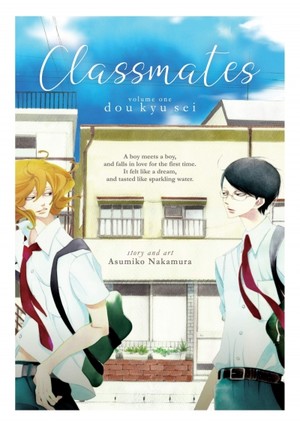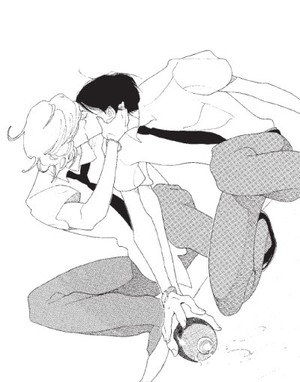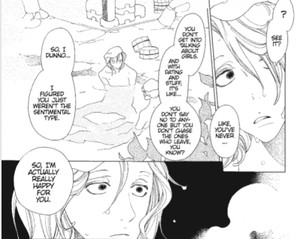The Spring 2019 Manga Guide
Classmates
What's It About?
 Hikaru Kusakabe is your average high school boy wiling his way through life and having difficulty deciding which college he'd like to go to. Rihito Sajo is the opposite: Top of his class, having a blank check to basically any college he'd want.
Hikaru Kusakabe is your average high school boy wiling his way through life and having difficulty deciding which college he'd like to go to. Rihito Sajo is the opposite: Top of his class, having a blank check to basically any college he'd want. So imagine the shock and surprise when, one day, Hikaru begins to tutor Rihito in music for the school choir, being in a band himself. This, however, is the start of something much more. For as this continues, Rihito and Hikaru begin to fall in love. And though a teacher with complicated feelings, the pains and difficulty of proper communication and Rihito's aspirations to go to Kyoto University might stand in the way, ultimately nothing can slow down the escalating feelings the two have for one another.
Though they began as just simple classmates, at odds in perspective and personality, they ultimately form a connection as tender and deep as it is surprising. But, as summer starts to shine its rays and entrance exams begin, will the two be able to whether the changes? Or will their romance fall by the wayside in the summer heat?
Classmates: Do Kyu Sei is an original manga by Asumiko Nakamura. It is published by Seven Seas, retailing for $12.99 physically and digitally.
Is It Worth Reading?

Rebecca Silverman
Rating: 3.5
If all you've read from Asumiko Nakamura is Utsubora, you may find it hard to believe that she can write a sweet love story. Enter Classmates, a truly charming BL title that you'd never guess was Nakamura's first venture into the genre. Granted, BL is a genre with enough staple tropes that it's fairly easy to work within them to create a viable story (there's perhaps a reason that romance is the easiest branch of publishing to break into), but to turn those into not just a checklist but an actual story is still not always a simple feat. Fortunately for us, that latter is precisely what happens here.
That's not to say that Classmates isn't without its standard genre elements. The story follows two high school boys as they embark on a relationship that neither of them is actively looking for, and it's full of the kind of warnings that populate BL and yuri stories – you know, that maybe both of them aren't actually gay or bi, that these relationships don't last when the characters leave their single-sex schools and get into the “real” world, etc. etc. There's also the slightly less requisite predatory adult teacher in the story as well, which is always an uncomfortable trope no matter the romance subgenre (at least for a teacher like me), but the story does a decent job of handling all of that. Most interesting is the way that one of Kusakabe's friends talks with him about his relationship towards the end of the volume – he comments that not only is he not uncomfortable with his friend being gay, but that he'd always kind of suspected because Kusakabe never said much when they and the rest of their friends started talking about girls and romance, nor did he ever pursue any of the girls who went after him.
The boys' romance is sweet and clearly two-sided. It at first does appear that Kusakabe is the more involved of the two, but he's really just the more outgoing character, as well as the most comfortable with the idea of romance. Once the whole teacher thing is resolved (and it really only plays a small part), he becomes an outside adult for Kusakabe to talk to about his relationship – and in one of my favorite BL scenes ever, the teacher tells him not to consult BL manga for sex information and seems willing to talk about it beyond just that bit of advice. As the book progresses, we get to see more of Sanjo's side of things as well, and realize that he's just kind of an awkward person, but that his relationship with Kusakabe is important to him – he's just going to move a little slower in acting on it.
Nakamura's artwork is striking, and if I don't always like it, I do appreciate it. Softer and full of more whiplash lines than her work in Utsubora, there's sort of a dream-like feel to the way she draws the characters and the sort of disregard for anatomy that works in a sweet love story. Some French kissing is as explicit as this book gets (so anatomy refers more to limbs longer than any should be), but if you don't need your BL to be hot and heavy, this is definitely worth a look.

Faye Hopper
Rating: 4
Classmates was one of the books I was most excited to read. I'm a sucker for a good romance, especially a queer romance. And, for the most part, Classmates delivers, portraying a low-stakes yet deeply impactful story of love and surprising connection.
Initially, however, I was a little put off by how forceful Hikaru was being (he makes a lot of moves without signaling first, oftentimes making Rihito uncomfortable) and the teacher coming onto Rihito (even if the sensei's emotional isolation as the only queer man he knows is captured pretty well, I just wish it didn't end in him trying to kiss Rihito). It speaks to a certain truth of teenage flirtation (i.e., everyone is just flailing around aimlessly), but it blurs the lines of consent a little too much for me to be comfortable with it. The back half of the book is what ultimately sold me on Classmates. There's a scene that represents everything I love about Classmates: Rihito, after watching Hikaru's band play for the final time, sees him being asked for his email by a fan who has a crush on him. He flies into a frenzy, leaves the show in a terrible stew of anxiety…only for Hikaru to find him and leap onto him in a flying hug. This is what romance is: Thinking the worst, most terrifying thoughts, only for them to fall away in the face of true love and intimacy. I almost burst into tears at this moment (and it wasn't the last time I did so, either).
Classmates is a touching story that couches its romance in a great sense of humor, naturalistic dialogue and a deep understanding of its characters. It ends not with definitive conclusion but instead quiet progression; Rihito kisses Hikaru, and his arc is complete. Who knows what happens to them next? Does Rihito go to Kyoto and leave Hikaru behind, forever? It doesn't matter. Because Classmates isn't about the full-span of a relationship but instead a moment in time; the first, complicated pangs of love, where no one knows what they're doing, and a lot of mistakes are made. The fact that it is a queer romance, presented with nuance and emotional reality, makes it radical. These are the kind of romances I want to write, the ones that are true to my experience as a pansexual trans woman. Because queer love is just as complicated, messy and beautiful as the greatest straight romances of the literary canon. And in this way, though on the surface it is a just simple, sweet, honest love-story, it becomes something much more.
discuss this in the forum (35 posts) |
this article has been modified since it was originally posted; see change history
back to The Spring 2019 Manga Guide
Feature homepage / archives